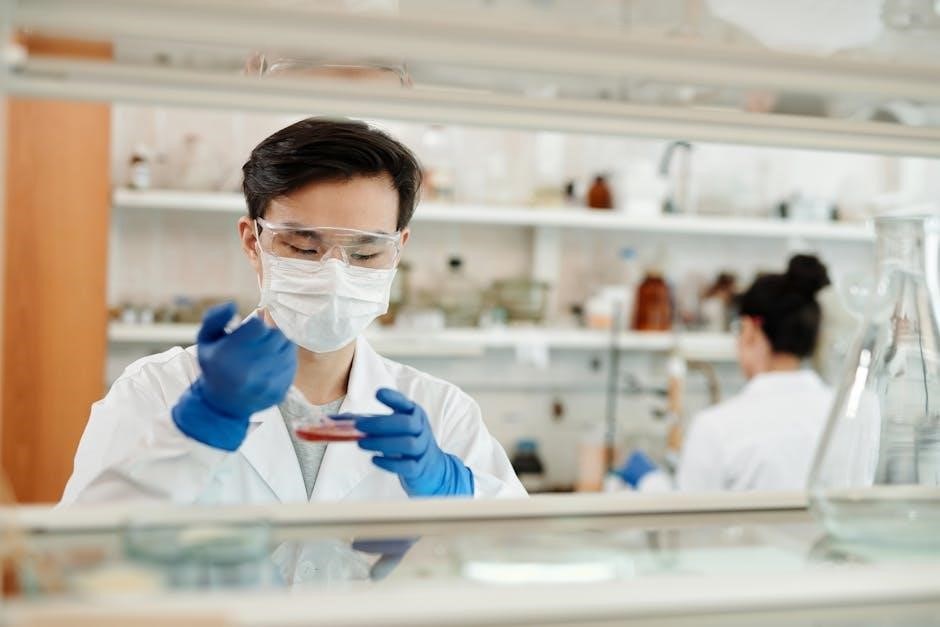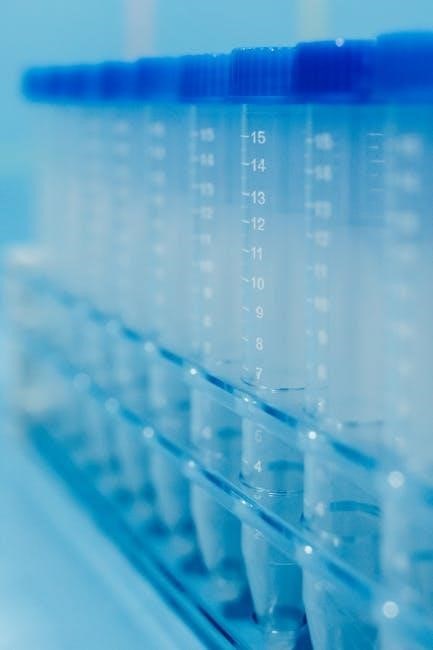Fake DNA test PDFs are customizable documents designed to mimic real DNA results for various purposes, such as pranks, education, or research, raising both creative and ethical concerns.
1.1 Overview of Fake DNA Test PDFs
Fake DNA test PDFs are downloadable templates designed to mimic real genetic test results for various purposes, such as pranks, educational projects, or research. These documents often include customizable fields for names, dates, and DNA markers, allowing users to create realistic-looking reports. They are widely available online and can be edited using software like PDF editors or design tools, making them accessible for personal or creative use.
1.2 Why People Seek Fake DNA Test Results

Individuals seek fake DNA test results for diverse reasons, including educational projects, research, or entertainment purposes like pranks. These documents provide a realistic format for creative or academic use, allowing users to customize details such as names, dates, and genetic markers. The accessibility of free templates online has made it easier for people to generate fake DNA reports for various personal or professional needs.
Uses of Fake DNA Test Results
Fake DNA test results are used for educational projects, research, pranks, or entertainment. They provide realistic formats for creative or academic purposes, easily accessible online.
2.1 Pranks and Entertainment Purposes
Fake DNA test PDFs are often used for harmless pranks or entertainment. They allow users to create realistic-looking results for fun surprises or creative storytelling. Customizable templates make it easy to design believable scenarios, adding excitement to light-hearted situations. These fake tests are popular for their ability to shock or amuse, making them a versatile tool for social interactions or fictional narratives.
2.2 Educational or Research Projects
Fake DNA test PDFs serve as valuable tools in educational settings, enabling interactive learning experiences. Students can engage with mock results to explore genetic concepts, while researchers use them to study public reactions to DNA testing. These templates simplify complex scientific ideas, making them accessible for classroom discussions or ethical debates, fostering critical thinking and practical understanding of DNA science and its implications.
2.3 Legal Implications of Using Fake DNA Tests
Using fake DNA test results can lead to serious legal consequences, including fraud charges and allegations of forgery. Misrepresentation of DNA results may violate intellectual property rights and ethical standards, potentially leading to legal action. It is crucial to understand the legal ramifications before creating or distributing such documents, ensuring compliance with laws and avoiding misuse that could harm individuals or organizations.

How to Create a Fake DNA Test Result
Creating a fake DNA test involves using design tools like Adobe Acrobat or Canva. Start with a template, add realistic data, and ensure a professional format.
3.1 Tools and Software for Designing Fake DNA Tests
Popular tools for creating fake DNA tests include Adobe Acrobat, Canva, and Google Docs. These platforms offer templates and design features to craft realistic documents. Microsoft Word and online PDF editors are also widely used for customization. Choose software that aligns with your design skills to ensure a professional-looking result.
3.2 Steps to Create a Realistic Fake DNA Test
To create a realistic fake DNA test, start by selecting a template from platforms like pdfFiller or Canva. Customize fields with personal information and test details. Add visual elements such as barcodes, watermarks, or logos for authenticity. Use professional fonts and ensure proper formatting. Finally, review and edit the document to ensure accuracy and realism before saving or sharing.
3.3 Tips for Making the Fake Test Look Authentic

Legal and Ethical Considerations
Using fake DNA tests can lead to legal consequences and raise ethical concerns, such as fraud or emotional harm. Always use such documents responsibly and with caution.
4.1 Potential Consequences of Using Fake DNA Tests
Using fake DNA tests can lead to legal consequences, including fraud charges or civil lawsuits. Misuse can cause emotional harm to individuals or families. Unauthorized use in legal matters may result in criminal charges, highlighting the importance of ethical considerations and responsible use of such documents.
4.2 Ethical Dilemmas Surrounding Fake DNA Results
Fake DNA test results raise significant ethical concerns, primarily due to their potential for deception and emotional harm. They can undermine trust in legitimate DNA testing, which is crucial for legal and personal matters. Their use challenges the integrity of scientific processes and personal relationships, emphasizing the need for ethical responsibility.
Finding Free Fake DNA Test Templates
Fake DNA test PDFs are available online for free, enabling users to create realistic documents. Platforms like PDFiller offer customizable templates for editing to suit individual needs at no cost.

5.1 Popular Platforms for Downloading Fake DNA Test PDFs
Platforms like PDFiller, Template.net, and Google Docs offer free fake DNA test templates. These websites provide customizable documents, enabling users to create realistic PDFs for various purposes, including pranks, education, or research. They often feature user-friendly interfaces and support multiple devices, making it easy to access and edit fake DNA test results online.
5.2 How to Customize Fake DNA Test Templates
Customizing fake DNA test templates involves editing text fields, inserting logos, and adding signatures. Use platforms like PDFiller or Google Docs to modify templates. Enter desired names, dates, and test details. Ensure the design matches real DNA reports for authenticity. Save and download the customized PDF for use in pranks, educational projects, or other purposes.

Privacy and Security Concerns
Handling fake DNA test PDFs requires protecting sensitive information to prevent identity theft or misuse. Ensure documents are stored securely and accessed only by authorized individuals.
6.1 Protecting Personal Information in Fake DNA Tests
When creating or using fake DNA test PDFs, it’s crucial to protect personal information. Avoid including real sensitive details like names, addresses, or genuine identifiers. Use secure platforms for editing and sharing to prevent unauthorized access. Ensure that templates are customized without compromising individual privacy. Always verify the legitimacy of websites offering free fake DNA test PDFs to avoid data breaches or scams.
6.2 Securing Fake DNA Test PDFs from Unauthorized Access
To prevent unauthorized access, use password-protected PDFs or encryption. Ensure secure sharing methods and verify recipient authenticity. Avoid using untrusted platforms for downloading or editing fake DNA test templates. Regularly update security software to safeguard against breaches. Always review privacy settings on sharing platforms to maintain control over document access and prevent unintended distribution or misuse of the fake DNA test PDFs.

Psychological Impact of Fake DNA Tests
Fake DNA tests can cause emotional distress, strained relationships, and trust issues. The anxiety of receiving false results may lead to long-term psychological effects on individuals.
7.1 How Fake DNA Tests Can Affect Relationships
Fake DNA tests can strain relationships by creating mistrust and emotional conflict. False results may lead to accusations, misunderstandings, and strained communication, potentially causing long-term damage to personal connections and trust.
7.2 The Emotional Toll of Receiving Fake DNA Results
Receiving fake DNA results can cause significant emotional distress, including anxiety, confusion, and feelings of betrayal. Individuals may experience mistrust in relationships or personal turmoil, as the false information can lead to unnecessary emotional pain and confusion about their identity or connections, affecting their overall well-being and mental health.

Real vs. Fake DNA Tests
Real DNA tests are conducted by certified labs, ensuring accuracy and legitimacy, while fake tests are often homemade or downloaded, lacking scientific backing and authority.
8.1 Differences Between Genuine and Fake DNA Results
Genuine DNA results are produced by certified laboratories using advanced scientific methods, ensuring accuracy and reliability. They typically include detailed genetic data, official seals, and verification processes. In contrast, fake DNA results are often created using downloadable templates or basic software, lacking scientific validation. While they may mimic the appearance of real tests, they lack the authority and precision of professionally conducted DNA analyses.
8.2 Identifying Red Flags in Fake DNA Test PDFs
Fake DNA test PDFs often lack official laboratory seals, use generic templates, and contain grammatical errors. They may include unrealistic or exaggerated results, inconsistent formatting, and missing verification processes. Additionally, fake tests frequently require users to input personal information, which genuine tests typically avoid. These red flags help distinguish counterfeit documents from authentic DNA test results.

Educational Value of Fake DNA Tests
Fake DNA tests serve as innovative educational tools, allowing students to engage with genetic concepts through simulated results and hands-on projects, enhancing their understanding of DNA testing processes and lab procedures.
9.1 Using Fake DNA Tests for Educational Purposes
Fake DNA tests offer a practical tool for education, enabling students to explore genetic concepts through project-based learning and real-world applications. They allow learners to analyze simulated results, fostering critical thinking and problem-solving skills. These tests are particularly useful in biology or forensic science classes, providing a hands-on experience without requiring advanced lab equipment. They also help students understand the procedures and interpretations involved in DNA testing, preparing them for future studies or careers in genetics.
9.2 Teaching Students About DNA Testing Through Fake Results
Fake DNA test results provide a practical way to engage students in understanding genetic testing. By simulating real-world scenarios, educators can demonstrate DNA analysis techniques and ethical considerations. These tools help students grasp complex concepts, such as paternity testing or forensic analysis, fostering a deeper understanding of genetics and its applications in a safe, controlled environment.
Fake DNA test PDFs offer versatility for creative, educational, and research purposes but raise ethical concerns. Their use requires responsibility to avoid misuse and potential harm to individuals.
10.1 Final Thoughts on Fake DNA Test PDFs
Fake DNA test PDFs provide creative solutions for entertainment and education but must be used responsibly. While they offer convenience and accessibility, their potential for misuse highlights the need for ethical awareness and caution to prevent harm or deception.
10.2 The Future of Fake DNA Test Usage
The future of fake DNA test PDFs likely involves increased use in education and entertainment, with advancements in technology making them more realistic. However, ethical and legal challenges must be addressed to prevent misuse. As awareness grows, responsible innovation and clear guidelines will shape their application, balancing creativity with caution to ensure they remain a harmless tool for specific purposes.